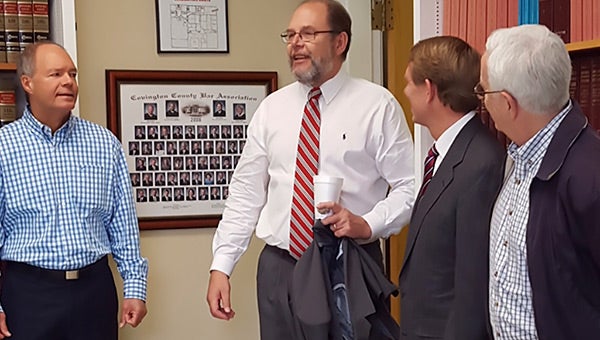McKathan reflects on law, career
Published 1:18 am Friday, March 18, 2016
Co-workers in the Covington County Courthouse say they have never seen Circuit Judge Ashley McKathan smile like he was smiling this week, when he officially ended a 25-year tenure on the bench.
The longtime judge said he decided to become a lawyer when he was five.
“There used to be a cafe down past the Timmerman Building called Rooster’s Café. I lived at the time with my grandparents, a great uncle and a great grandmother.
“We were country people. The only time I had ever seen anybody dressed up was at church.”
His great uncle Sydney was coming to town and brought young McKathan with him.
“There was a table full of people, in the middle of the week, dressed up. I asked my uncle why all those people were so dressed up. He replied, ‘Awe. That’s a bunch of old lawyers.’
The line drew a laugh all around, but the image stuck with the five-year old.
“I thought it was pretty cool that those guys got to dress nice, have fun and they seemed to be prosperous, in the middle of the week. It made an impression, and that was what I always was going to do.”
After graduating high school at Pleasant Home, he studied at LBW Community College, the University of South Alabama, and then went to the University of Alabama for law school. A good portion of the courses he took were at night.
“I was able to work my way through, with some help from some family,” he said.
The practice of law has changed drastically during his career, he said.
“It’s not even the same profession as when I started,” he said. “When I started, almost every lawyer would practice for a while with somebody before he went out and started his own firm. There were several firms in town that had three, four, five or six lawyers. They had been around forever. There was a lot of institutional knowledge there.
“Most of the firms that were here when I started, are gone. They’d been here always.
“I think about the Powell Law Firm, the Tipler Law Firm, the Albritton Law Firm, and the Jones Law Firm,” he said. “Where as today, if a man goes to law school, he’s pretty apt just to come out and open up a practice, because a lot of those institutions are gone.”
McKathan worked in the Powell Law Firm, with Abner Powell Jr., Ab Powell III and Beatty Pearson.
“We did insurance, defense work, plaintiff’s cases, wills,” he said. He also practiced solo for a short period before earning a place on the bench.
There’s also not as much money in the practice of law as there once was, he said.
About his Ten Commandments robe
“The law of punitive damages has changed so much, it’s not nearly the issue it used to be,” he said. “Law of fraud has been reigned in to the extend that while there used to be a lot of fraud cases, there’s not anymore. Automobile warranty cases filled the docket, or defective car cases, but they’ve disappeared on account of mandatory arbitration.”
Now, he said, most attorneys earn most of their living in domestic work or criminal work.
“Civil practice is not what it used to be,” he said.
Drugs and drug-related offenses jam most of the dockets, he said.
“The really frustrating thing about it is that it is so hard to get to any of the kingpins,” he said. “A lot of them are out of state, and they are very well organized. People don’t give up their dealers very much.”
Another thing that has changed is the domestic practice, he said, “because of the extent to which marriage has been devalued.”
“When I came over here, there were two circuit judges just like there are now, and they alternated months of having the domestic day. So, every other month, each one would have a domestic day with about 14 cases on it.
“Now, both of us have a domestic day every month with about 40 cases on it,” he said. “What you put on that day are transactional, because the rest of the month, you’re trying domestic cases all month long.
“It strikes me that the government – both state and federal – will do anything to make divorce work better. But they won’t do anything to strengthen the institution of marriage.
“When people in a matter of 48 hours can get divorced, pretty soon they don’t see much difference in getting married and just living together. Then you have children out of wedlock, and a lot of homes in which there are no fathers. Both parents are necessary to produce a society full of well-rounded children.”
If he could be in charge of making instead of enforcing laws, he has one idea for changing the trend.
“ In the 1970s, I think, Ronald Regan was the governor of California and that state produced the first no-fault divorce statute. If you didn’t get along, you could get divorced. All the other states followed suit.
“I think I would say to people, if I could make the law, is once you have children, you could be divorced, but not on no fault grounds, until children reach a certain age – 14 maybe. The children are the ones who suffer. Parents ought to be the ones who suffer instead of putting children through all that they do.”
To anyone considering a career in the law now, he’d first advise that it can be a thankless profession.
“There’s not necessarily a lot of money in it anymore,” he said. “So often when you represent people, you help one person, but you harm another.
“But, as with any other profession there are saints and sinners. And as you go through the years, you can either do those little things along the way that makes a difference in peoples’ lives, or you can ignore that, and that’s what makes all the difference.”
McKathan also is a lay minister at Dixie Community Church, a non-denominational church where he says those of the Baptist or holiness background would be comfortable.
McKathan was reared a Baptist, but fell away from church in his youth.
“About the time my son was born, I had a true salvation experience,” he said. “And so I began going to church and very, very slowly began to take on little duties and things. I had gotten so far away from it that I didn’t see myself as worthy of taking much of a role.
“That’s not very doctrinal, but it’s the way I felt,” he said. Gradually, he grew more comfortable with his church work, and it became the center of his life. When the church was being organized at Dixie, the timing was right.
“I was in a very excellent church, which had plenty of talent, and that I loved very much and still do – Pleasant Home. But the fact that the little church at Dixie was always closed, it bothered me. I sort of felt I was led to help some of the people down there get open again, that’s how it started.”
Despite the frustrations he sometimes feels, his professional work has been rewarding, he said.
“I’d like to say that being a judge has been very rewarding. I’m very thankful to people for letting me do that. It’s also been very hard at times, and Christ has somehow walked me through it.”
McKathan’s retirement became official this week, but he still has some work to finish.
“The presiding circuit judge (now Circuit Judge Lex Short) has the authority to appoint any attorney to be sort of a helper judge for up to six months,” McKathan said Thursday, shortly after his successor had been sworn in. “I have a lot of things under submission. It’s not fair to dump that on the next guy, so I’ll be here 30 to 60 days, making sure it all goes out.”






